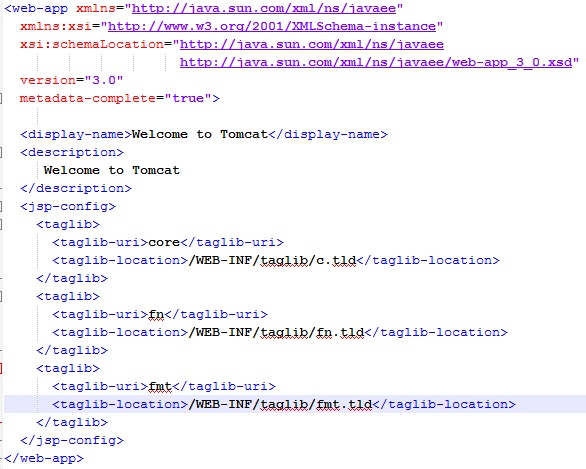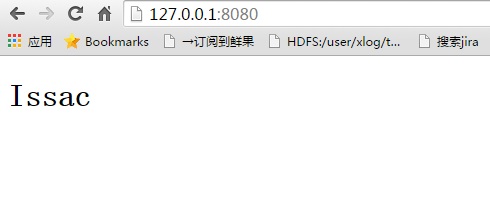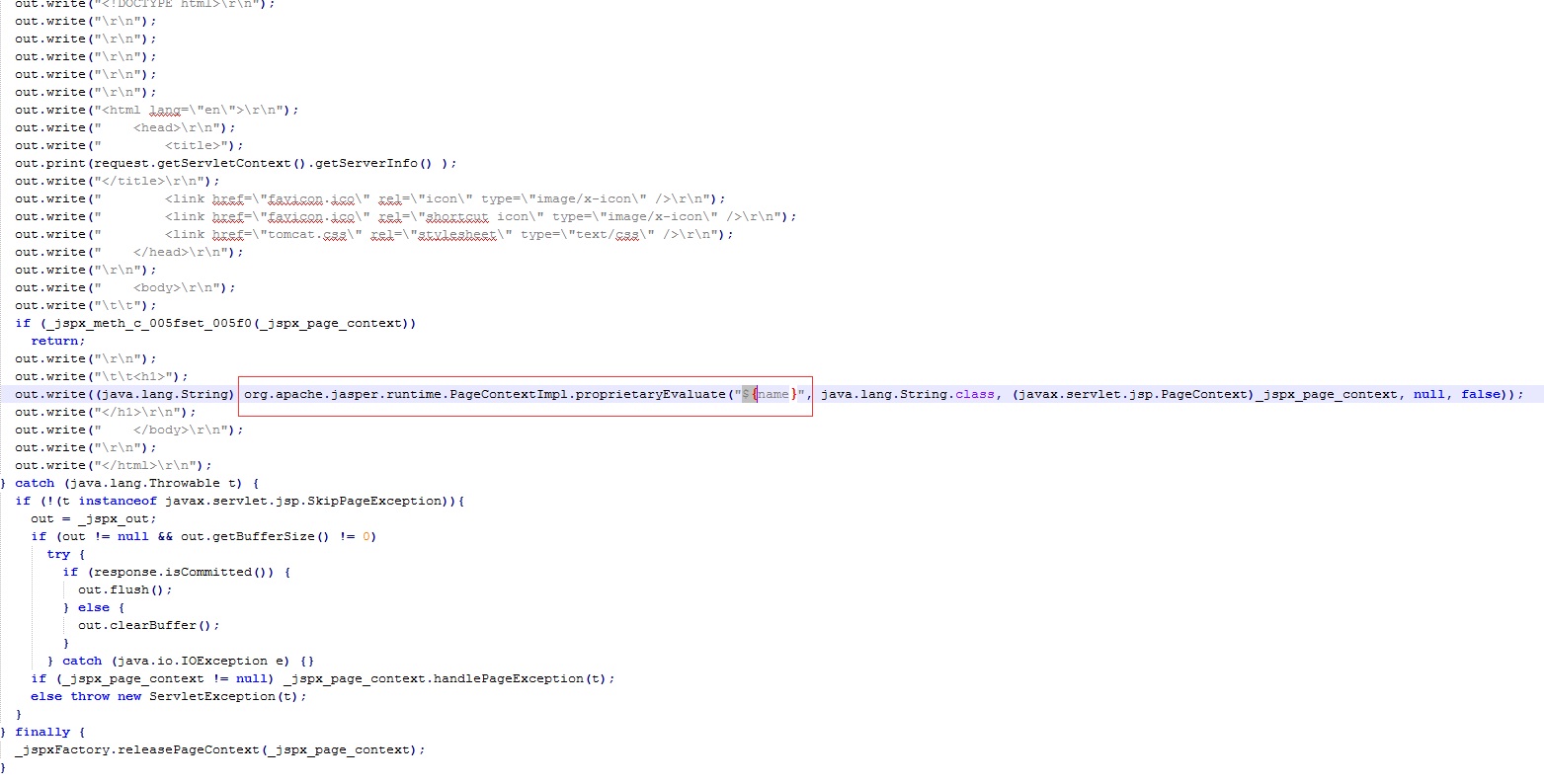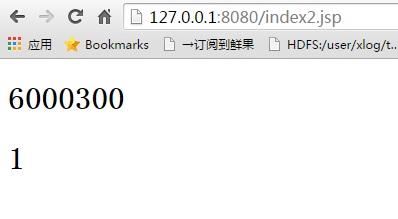EL表达式支持Lambda
前些天有同事发现同样的EL表达式在tomcat和resin容器下某些行为稍有不同(具体什么语句不太记得了,类似${false=="FALSE"}这样的语句结果不同),于是抱着好奇心想去探究一下EL表达式到底是什么,同时平时接触的都是tomcat容器,那么就拿tomcat的源码来研究下好了。
在eclipse中启动tomcat
- 导入:tomcat源码下有用于ant构建的build.xml,但是公司电脑上没装ant,就用了个最暴力的办法新建个eclipse项目,然后把源码目录下的java目录下的内容copy进新建的项目,同时为了项目运行正确,还需要把源码中的conf和webapps目录都copy到工程的根目录中。
- 启动:tomcat的入口方法在
找到这个Bootstrap类,然后run即可,这时打开浏览器输入127.0.0.1:8080就会看到熟悉的tomcat了org.apache.catalina.startup.Bootstrap.main(String[]) - 添加jstl支持,修改webapps/ROOT/WEB-INF/web.xml,添加如下内容:

- 同时copy一份taglib放到webapps/ROOT/WEB-INF/ 目录下
- 最终结果如下:


寻找EL表达式代码
一个http请求过来之后,首先tomcat经过层层解析,最终会把封装好的Request和Response传递给JspServlet,然后将jsp编译成java代码
编译好的java代码可以在works里面看到,比如上面的jsp会生成如下源码:

可以看到这一步只是编译了jsp代码,对于EL表达式,是在
org.apache.jasper.runtime.PageContextImpl.proprietaryEvaluate(String, Class, PageContext, ProtectedFunctionMapper, boolean)
这个方法里面获取EL表达式的值
EL表达式求值主要分为两步:
- 解析EL表达式,生成AST(抽象语法树),tomcat中使用JJTree&JavaCC生成的parser来从String中构建出org.apache.el.parser.Node的Tree
- AST求值,从AST根节点开始递归调用各个Node的getValue方法,最终返回结果
HOOK EL表达式
前些天看了些编译原理的书,于是突发奇想,如何才能让jsp中的EL表达式支持lambda呢,比如这样:

定义lambda的语法是以"\"开头,然后是参数列表,然后是"->",最后是方法体
使用lambda的语法是以"/"开头,然后是lambda的identifier,参数放到"[]"里面 (其实最开始的想法是直接用f(param1,param2)这样的形式,但是tomcat在解析el表达式之前会对function做一次vailidate,这里用中括号就是为了避免这个validate,否则要改很多代码)
首先当然是要修改解析EL表达式生成AST的代码了,我们先定义两个新的节点类型,实现getValue方法,用来从AST中递归调用getValue获取最终结果:
/**
* AstLambda 表示一个定义lambda的语法树
* children列表最后一项表示->右边的部分,第1~(length-2)项为lambda的参数列表
*/
public final class AstLambda extends SimpleNode {
public AstLambda(int i) {
super(i);
}
/**
* getValue直接返回节点对象本身,方便在未来被调用的时候使用
*/
@Override
public Object getValue(EvaluationContext ctx) throws ELException {
//throw new UnsupportedOperationException();
return this;
}
/**
* 这里toString直接返回""
* 因为直接用${\x->x+1}不会在页面上输出内容(因为要用lambda,所以一般要在c:set 标签中定义lambda)
*/
@Override
public String toString(){
return "";
}
}
/**
* 表示调用lambda的语法树
* children列表第1项表示引用lambda的identifier,后面为调用lambda传入的参数
*/
public final class AstInvoke extends SimpleNode {
public AstInvoke(int i) {
super(i);
}
/**
* 这里getValue首先从children[0]中获取定义lambda时放到pageContext中的AstLambda对象
* 然后从chidlren[1~(length-1)]中一次获取各个参数的AST,然后getValue并放到CTX的lambda的LambdaLocal中(这个也是个人自己加的,为了方便保存lambda的参数的作用域)
* 然后调用AstLambda.children[lenght-1].getValue()获取最终结果
*/
@Override
public Object getValue(EvaluationContext ctx)
throws ELException {
Object obj1 = this.children[0].getValue(ctx);
if(!(obj1 instanceof AstLambda)){
throw new ELException("Can not found Lambda in this context");
}
AstLambda lambda = (AstLambda)obj1;
int length = lambda.children.length;
if(length!=this.children.length){
throw new ELException("Params not match for Lambda");
}
Node body = lambda.children[length-1];
//update ctx
for(int i=1;i<this.children.length;i++){
AstIdentifier identifier = (AstIdentifier)(lambda.children[i-1]);
String image = identifier.getImage();
ctx.setLambdaLocal(image, this.children[i].getValue(ctx));
}
Object ret = body.getValue(ctx);
//reload ctx
ctx.clearLambdaLocal();
return ret;
}
}
然后在org.apache.el.parser.ELParser列中加入用来构建Lambda相关节点的方法:
/*
* Unary For '-' '!' 'not' 'empty', then Value
*/
final public void Unary() throws ParseException {
switch ((jj_ntk == -1) ? jj_ntk() : jj_ntk) {
case MINUS:
jj_consume_token(MINUS);
AstNegative jjtn001 = new AstNegative(JJTNEGATIVE);
boolean jjtc001 = true;
jjtree.openNodeScope(jjtn001);
try {
Unary();
} catch (Throwable jjte001) {
if (jjtc001) {
jjtree.clearNodeScope(jjtn001);
jjtc001 = false;
} else {
jjtree.popNode();
}
if (jjte001 instanceof RuntimeException) {
{
if (true)
throw (RuntimeException) jjte001;
}
}
if (jjte001 instanceof ParseException) {
{
if (true)
throw (ParseException) jjte001;
}
}
{
if (true)
throw (Error) jjte001;
}
} finally {
if (jjtc001) {
jjtree.closeNodeScope(jjtn001, true);
}
}
break;
case NOT0:
case NOT1:
switch ((jj_ntk == -1) ? jj_ntk() : jj_ntk) {
case NOT0:
jj_consume_token(NOT0);
break;
case NOT1:
jj_consume_token(NOT1);
break;
default:
jj_la1[22] = jj_gen;
jj_consume_token(-1);
throw new ParseException();
}
AstNot jjtn002 = new AstNot(JJTNOT);
boolean jjtc002 = true;
jjtree.openNodeScope(jjtn002);
try {
Unary();
} catch (Throwable jjte002) {
if (jjtc002) {
jjtree.clearNodeScope(jjtn002);
jjtc002 = false;
} else {
jjtree.popNode();
}
if (jjte002 instanceof RuntimeException) {
{
if (true)
throw (RuntimeException) jjte002;
}
}
if (jjte002 instanceof ParseException) {
{
if (true)
throw (ParseException) jjte002;
}
}
{
if (true)
throw (Error) jjte002;
}
} finally {
if (jjtc002) {
jjtree.closeNodeScope(jjtn002, true);
}
}
break;
case EMPTY:
jj_consume_token(EMPTY);
AstEmpty jjtn003 = new AstEmpty(JJTEMPTY);
boolean jjtc003 = true;
jjtree.openNodeScope(jjtn003);
try {
Unary();
} catch (Throwable jjte003) {
if (jjtc003) {
jjtree.clearNodeScope(jjtn003);
jjtc003 = false;
} else {
jjtree.popNode();
}
if (jjte003 instanceof RuntimeException) {
{
if (true)
throw (RuntimeException) jjte003;
}
}
if (jjte003 instanceof ParseException) {
{
if (true)
throw (ParseException) jjte003;
}
}
{
if (true)
throw (Error) jjte003;
}
} finally {
if (jjtc003) {
jjtree.closeNodeScope(jjtn003, true);
}
}
break;
case INTEGER_LITERAL:
case FLOATING_POINT_LITERAL:
case STRING_LITERAL:
case TRUE:
case FALSE:
case NULL:
case LPAREN:
case IDENTIFIER:
Value();
break;
case LAMBDA:
//声明lambda
Lambda();
break;
case DIV0:
//调用lambda
Invoke();
break;
default:
jj_la1[23] = jj_gen;
jj_consume_token(-1);
throw new ParseException();
}
}
final public void Invoke() throws ParseException {
jj_consume_token(DIV0);
AstInvoke jjtn000 = new AstInvoke(JJTINVOKE);
boolean jjtc000 = true;
jjtree.openNodeScope(jjtn000);
try{
Identifier();
jj_consume_token(LBRACK);
InvokeParams();
jj_consume_token(RBRACK);
}catch(Throwable jjte000){
if (jjtc000) {
jjtree.clearNodeScope(jjtn000);
jjtc000 = false;
} else {
jjtree.popNode();
}
if (jjte000 instanceof RuntimeException) {
{
if (true)
throw (RuntimeException) jjte000;
}
}
if (jjte000 instanceof ParseException) {
{
if (true)
throw (ParseException) jjte000;
}
}
{
if (true)
throw (Error) jjte000;
}
}finally{
if(jjtc000){
jjtree.closeNodeScope(jjtn000, jjtree.nodeArity()>1);
}
}
}
final public void Invoke() throws ParseException {
jj_consume_token(DIV0);
AstInvoke jjtn000 = new AstInvoke(JJTINVOKE);
boolean jjtc000 = true;
jjtree.openNodeScope(jjtn000);
try{
Identifier();
jj_consume_token(LBRACK);
InvokeParams();
jj_consume_token(RBRACK);
}catch(Throwable jjte000){
if (jjtc000) {
jjtree.clearNodeScope(jjtn000);
jjtc000 = false;
} else {
jjtree.popNode();
}
if (jjte000 instanceof RuntimeException) {
{
if (true)
throw (RuntimeException) jjte000;
}
}
if (jjte000 instanceof ParseException) {
{
if (true)
throw (ParseException) jjte000;
}
}
{
if (true)
throw (Error) jjte000;
}
}finally{
if(jjtc000){
jjtree.closeNodeScope(jjtn000, jjtree.nodeArity()>1);
}
}
}
final public void InvokeParams() throws ParseException {
Unary();
try{
jj_consume_token(COMMA);
InvokeParams();
}catch(ParseException e){
}finally {
}
}
/**
* Lambda Defines Like \x->x+1
* @throws ParseException
*/
final public void Lambda() throws ParseException {
jj_consume_token(LAMBDA);
// 定义
AstLambda jjtn001 = new AstLambda(JJTLAMBDA);
boolean jjtc001 = true;
jjtree.openNodeScope(jjtn001);
try {
// params
Params();
jj_consume_token(MINUS);
jj_consume_token(GT0);
Expression();
// invoke
} catch (Throwable jjte001) {
if (jjtc001) {
jjtree.clearNodeScope(jjtn001);
jjtc001 = false;
} else {
jjtree.popNode();
}
if (jjte001 instanceof RuntimeException) {
{
if (true)
throw (RuntimeException) jjte001;
}
}
if (jjte001 instanceof ParseException) {
{
if (true)
throw (ParseException) jjte001;
}
}
{
if (true)
throw (Error) jjte001;
}
} finally {
if (jjtc001) {
jjtree.closeNodeScope(jjtn001, jjtree.nodeArity() > 1);
}
}
}
final public void Params() throws ParseException {
/* @bgen(jjtree) Identifier */
Identifier();
try{
jj_consume_token(COMMA);
Params();
}catch(ParseException e){
//pass
}finally{
}
}
还要定义一些常量标识"\" "/"符号和AstLambda AstInvoke节点类型(这部分代码就不贴出来了)
最终结果:

总结:
- EL表达式的解析还是比较简单的,直接生成抽象语法树,然后再在AST中递归求值
- 修改JJTree&javaCC生成的代码太痛苦了,各种莫名其妙的变量命名~
- EL表达式中定义的变量一般是在Context中取值的,为了便于给lambda传参数,在ctx中加入了一个新的map来保存参数名和值的映射
- 只是觉得好玩才做的hook,lambda也不支持递归调用,总之是非常简单的尝试,用在生产肯定是不可能的了:)
- 完整代码见src.tar